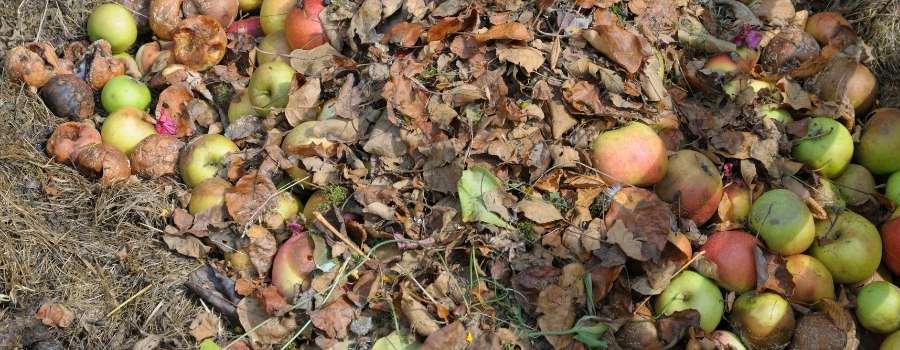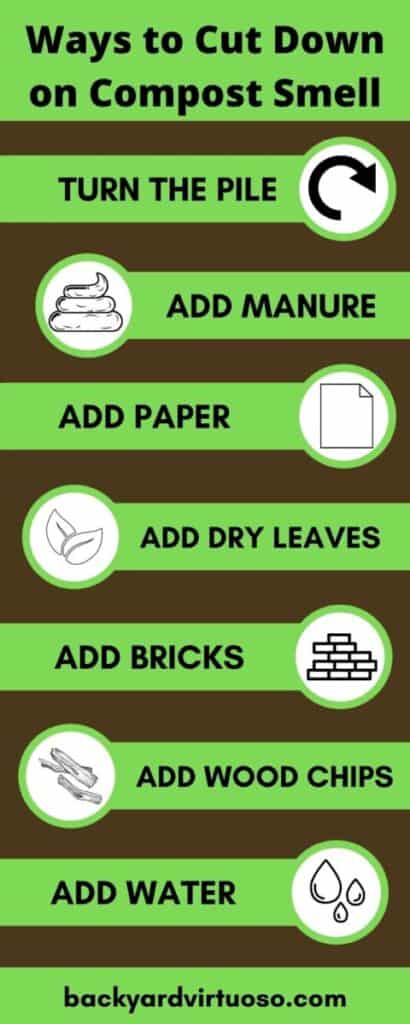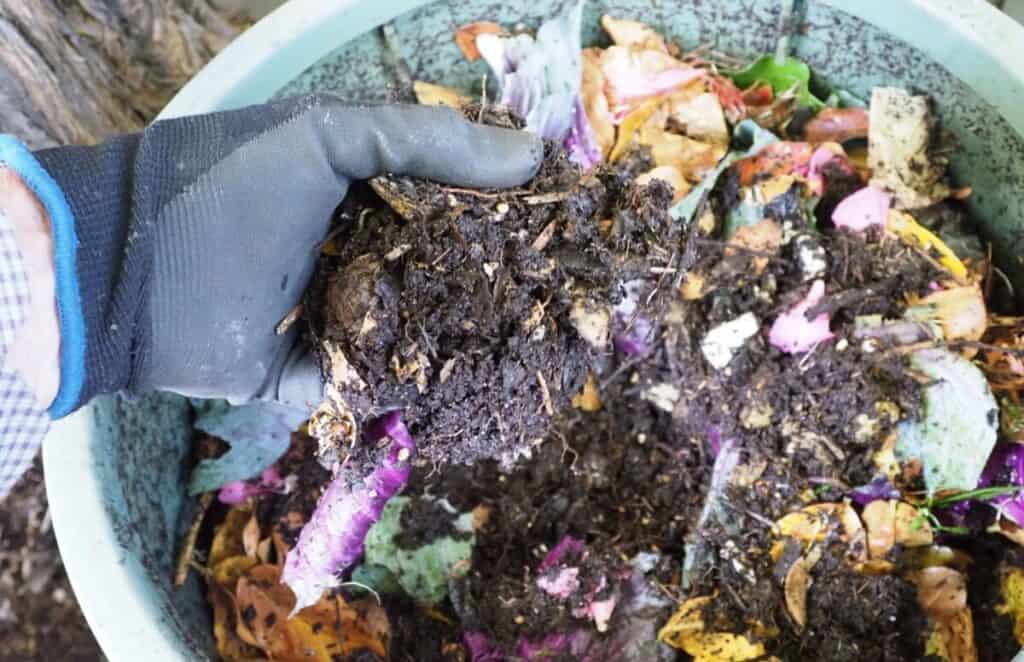
For some, the thought of composting in your backyard may not seem like the most pleasant idea. But, the reality is that…with a few tips and tricks…isn’t that bad at all, and the passage of time (along with microscopic critters) does most of the work for you!
A lot of people are concerned about the smell of composting and if it’ll ruin their enjoyment of their backyard…or yield complaints from neighbors.
There are a few things you can do to make sure your compost pile smell as little as possible, and even if it does start to smell there are ways to get rid of the odor quickly.
I live in a fairly compact neighborhood, with a backyard that sets right up against four others…so I thought I’d dig around and consider the best solution to preventing compost smell and pass them on to you.
Does Backyard Compost Smell?
In general, a backyard compost pile should not have a strong smell. Finished compost should have an earthy, woodsy smell to it. If you’re unsure if your finished compost smells bad or not, just take a quick whiff of the pile before turning and after turning, if there is no difference in smell then all is well!
This isn’t to say that your compost bin won’t have a smell, but it should never be overwhelming. If you notice that your compost smells particularly bad, then it’s likely not finished and may still contain too much bacteria or meat/dairy products (which should never go into the bin).
If this is happening for whatever reason, try to turn the pile more frequently until it breaks down further…also look at adding in small amounts of manure which will help break everything down.
An active compost process will smell earthy/woodsy…when it smells bad it is usually because your compost material has become too ‘wet’ and started to decompose anaerobically.
If it is extremely hot outside and your compost pile has been left to decompose for a long time, you may notice some foul odors from the bacteria breaking down organic material in an oxygen-lacking environment. This usually only lasts a few days and can be mitigated by adding a bit of straw or hay to the pile.
If you find that your compost is smelling of ammonia, then it’s likely because of too much nitrogen-rich material (i.e., grass clippings). If this happens, try adding more browns like leaves or straw and turning the pile regularly until decomposition occurs again at a normal rate.
What Should Finished Compost Smell Like?
Typically, finished compost should have a woodsy and earthy smell to it. There are some people who prefer not to use manure in their backyard compost bins because the final product smells too much like livestock, though others argue manure is a key component to a hearty compost pile.
Finished compost should never smell like ammonia or sulfur, which are both signs that bacteria is still breaking down organic material.
Down below, I’ll go into more details about ways to help keep your compost bin smelling natural, but in short, you should regularly turn and mix your compost and add natural, dry materials to it like dried leaves, straw, or wood shavings.
How Do I Get Rid Of The Smell In My Compost Bin?
Even if you’ve taken all the precautions to make sure your compost smells good, there may be times when it begins to smell a little off. This is normal and can usually be fixed with one or more of these simple fixes:

- Regularly Turn The Pile
- Add Some Manure
- Add Shredded Paper or Cardboard
- Add Dry Leaves or Straw
- Add Bricks or Rocks
- Add Wood Chips or Shavings
- Add Water
Regularly Turn Your Compost
If your compost has been left for too long without turning, then decomposition will break down anaerobically, resulting in that awful smell of ammonia.
It’s possible that your compost is just too dense and needs to be loosened up a bit. If this happens, try turning the entire contents of the bin out onto a tarp or large piece of plastic sheeting (a wheelbarrow works well for this).
Then start breaking apart any clumps into smaller pieces with some garden forks or gloved hands. Then redistribute the contents back into a compost bin and turn regularly to speed up decomposition rates again.
Turning your compost is one of those simple fixes that should take care of most issues that result from your compost smelling bad or not decomposing properly.
Add Some Manure To Your Compost
If your backyard compost pile contains too much grass clippings or other nitrogen-rich material, then you can add some manure to help break things down more quickly and get rid of the excess nitrogen.
The best manure to use is chicken, goat, or cow manure since they are ‘hot’ manures (meaning that when added to the compost pile they will break down quickly).
If you don’t have access to any of these in your own yard, then look at buying some in bags from a garden center. Chicken and turkey manures tend to be cheaper than other types.
NEVER use human waste because this can spread diseases like salmonella and E. coli in your garden, which is definitely not something you want to be exposing yourself or members of your family!
Also, NEVER use droppings from house pets because dog and cat feces contain bacteria that can spread toxoplasmosis, which is a serious health issue.
Add Some Shredded Paper Or Cardboard
If you have been composting for a while but never added any brown material like shredded paper or cardboard, then this can help add some necessary carbon to your pile which will help break things down in a more balanced way.
Add A Layer Of Leaves Or Straw
This will help add some balance to your compost pile and stop the smell from getting too bad when it begins decomposing anaerobically or if there is excess nitrogen content. If you’re finding that your compost smells like ammonia, then this can be one of the best ways to fix it.
This can also help if your compost pile is too wet and isn’t breaking down at a normal rate. The dryness of the leaves and/or straw will absorb the moisture and wick it away from the center of the pile, allowing it to more easily dry.
Add A Layer Of Bricks Or Rocks
If your compost pile is constantly getting flooded by rainwater or you live in an area with high rainfall, then adding some bricks or rocks can help elevate the bin so that it’s not sitting on the ground. This will also help with drainage and is especially useful if you live in an area with heavy clay soil.
Add A Layer Of Wood Shavings
If you’re finding that your compost is taking too long to decompose, then adding some wood shavings (preferably cedar) can help speed up the process by providing necessary micro-organisms.
Add Some Water
If your pile smells like ammonia or doesn’t seem to be breaking down, it might just need a bit more moisture. Adding in some water should help everything break down faster and get your compost smelling more earthy and natural.
What Are Things I Should Compost?
For the most part, any organic materials like kitchen scraps, grass clippings, leaves, and other things can be added to your compost pile. Green compost will have more fruit and vegetable scraps, brown compost will have more woody materials like eggshells and twigs.
You want things that will break down quickly and provide nitrogen to the pile. The exact ratio of materials will depend on what you plan to use your compost for. Just make sure that anything you add has been chopped up into smaller pieces before being added, otherwise, it might not decompose as quickly.

What Should Not Go Into Compost?
Typically, any materials that will attract rodents or any that have been treated by pesticides should not be added to a compost pile.
Not everything is fair game for a compost pile. Some organic materials, like animal products (meat, bones, or dairy) will attract pests and rodents.
Also, don’t add in anything that has been treated with chemical pesticides or fertilizers since these can kill the microorganisms you want to encourage decomposition instead of inhibiting it. If possible try to avoid using grass clippings from lawns because these are usually treated with chemical fertilizers.
There are way more items that could be covered, but here is a shortlist and description of issues of materials that should NOT go in a compost pile:
Animal Products
Dairy and meat (including fish) can attract pests like raccoons, possums, or bears that might dig through the pile looking for food. This also includes bones that will take a very long time to decompose in backyard composting bins.
Even though this isn’t something you want to be adding to your compost if you do happen to get some of this in there accidentally then just leave it be and let the bacteria finish off what’s left behind.
Weeds
Weeds that have gone to seed because they will spread their seeds throughout your garden when added into backyard composting bins. Additionally, adding any plant material that has disease or pest problems can spread these to other areas of your garden.
Dog or Cat Feces
This is because they contain parasites and bacteria that you don’t want in the compost pile where food is being grown for yourself and your family members. This includes kitty litter as well since this contains chemicals designed to mask odors from house pets that might also be harmful to humans.
Diseased Plant
Plant material that is diseased (even if you’re composting them) because they can spread their disease throughout the pile, killing the needed bacteria needed to break down the pile and then spreading that disease to any plants you spread it over.
Rocks, Metal, or Glass
These will not break down in backyard composting bins and they might even contaminate your finished product with harmful chemicals like lead or mercury if they are broken apart while decomposing.
Additionally, you don’t want to introduce anything into your soil that is not plant-based because it will not be good for the micro-organisms that are living there.
A side note about rocks…since it’s also listed in the “things to add” section. Rocks can be added to the bottom of a compost pile to help pick it up off the ground. This will help with drainage and keep your pile from flooding.
Final Thoughts
Your compost should never have a strong, astringent odor like ammonia or bleach. If you notice that happening then there is something wrong and it might be time to turn your pile or add some more browns (carbon) like dried leaves, sawdust, or cardboard.
Compost may have a slight, unpleasant odor at first since materials haven’t started breaking down yet, but they shouldn’t be noticeable when a few feet away…and certainly not from your neighbor’s yard.
As long as you keep mixing your compost pile and keep a proper balance of greens and browns then you should never have to worry about your compost smelling bad!
